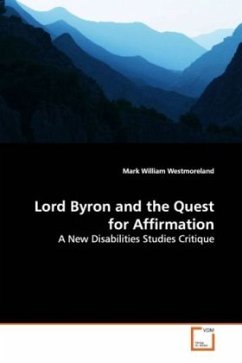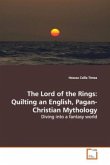With the rise of New Disability Studies, literary
scholars are continually reevaluating works by
disabled writers such as Lord Byron, who possessed a
club-foot. Some scholars, in addition to
reevaluating Byron s work, emphasize the legacy that
rests upon both his notorious lifestyle and his
extraordinary ability as a prolific writer.
Unfortunately, his lifestyle, and not his writing,
typically becomes the primary focus of too many
critics who ignore the value of New Disability
Studies. And yet, Byron s struggle with disability
and his consequent quest for affirmation laid the
foundation to make Byron s work exceptional and
explain why he continues to be studied as a
prominent literary genius. This book demonstrates
that disability inflects Byron s poetry to a greater
extent than Byron scholarship has hitherto
acknowledged. Furthermore, LORD BYRON AND THE QUEST
FOR AFFIRMATION will focus on and engage with the
hidden implications of disability in Byron s Manfred
and Cain and the explicit use of disability in The
Deformed Transformed while also examining Byron s
Calvinistic perspective of disability.
scholars are continually reevaluating works by
disabled writers such as Lord Byron, who possessed a
club-foot. Some scholars, in addition to
reevaluating Byron s work, emphasize the legacy that
rests upon both his notorious lifestyle and his
extraordinary ability as a prolific writer.
Unfortunately, his lifestyle, and not his writing,
typically becomes the primary focus of too many
critics who ignore the value of New Disability
Studies. And yet, Byron s struggle with disability
and his consequent quest for affirmation laid the
foundation to make Byron s work exceptional and
explain why he continues to be studied as a
prominent literary genius. This book demonstrates
that disability inflects Byron s poetry to a greater
extent than Byron scholarship has hitherto
acknowledged. Furthermore, LORD BYRON AND THE QUEST
FOR AFFIRMATION will focus on and engage with the
hidden implications of disability in Byron s Manfred
and Cain and the explicit use of disability in The
Deformed Transformed while also examining Byron s
Calvinistic perspective of disability.








